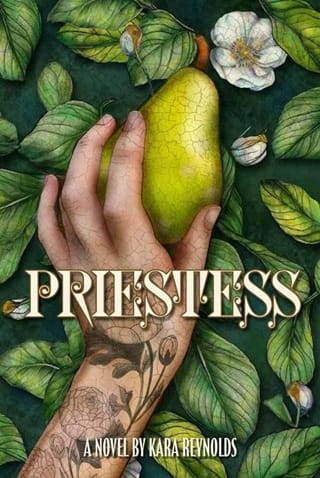1. Chapel
I am not a religious woman.
I do not deny the idea of gods and their demands on us mortals.
I am not against the existence of the otherworldly.
And I do not judge those who wish to know what is beyond death or to see into their future.
The idea of stepping into a fortuneteller’s has never been beneath me.
Simply, I have never wanted to know.
I was brought up by stringent believers and their faith exhausted and abused.
But instead of a justified bitterness towards belief, I have chosen only to dismiss it.
I built my life in a city-state that worshipped industry and education, so as not to find myself exhausted or hurt again by any faith.
And yet, this story begins in a temple of sorts, a chapel.
This story begins with me standing in a chapel and it begins when he came.
The location was an accident.
It was the closest doorway at the time.
I could have sworn I saw the black hair of my former husband’s head that day.
I was returning from a run to the marketplace for bread.
It was a workday at the scriptorium.
My fellow scribes and I were peckish, or more accurately, some of us were claiming to be peckish.
Our master was an indulgent and flirtatious one, always invested in staying in our good graces.
I believed him to be in no need of our good graces other than that he wanted them.
He needed to be liked.
He was a wealthy, if talented, man whose position, while earned, had come more easily to him than it would have had he not been the third son of a mining family.
All of his scribes were women, most of us pretty of face as well as good scriveners.
He enjoyed our flattery and thanks and so he continued in a cycle of little indulgences.
And we were, in return, productive and cheerful.
“Edie,”
he had said, barely looking up from his desk at the front of our workroom.
“Yes, sir?”
I had answered, fully looking up from my smaller desk amongst other smaller desks that faced his master desk.
It was set up much like a classroom at one of the city’s universities, for, a hundred winters before, the whole of the scriptorium had once been a university building.
I sat in the front row, closest to his desk as I was his head scribe.
“Maureen says she is hungry,”
our master replied, again still looking at his work.
Next to me, I heard Maureen’s mother, Helena, make a hmm noise.
Maureen, seated on the other side of her mother, leaned around her and looked to me with wide eyes.
She mouthed the word ‘please’ as she knew I would be the one going to the market.
He liked all of us, but only I was trusted with his purse.
On the other side of Maureen, Mischa leaned around her and also widened her eyes, mouthing, ‘I am hungry.’
I asked, “Sir, would you like me to go to market and see if the baker’s stall is open?”
He tilted his head to one side, as if contemplating a philosophical query.
Mischa rolled her eyes.
She found his flirtations an irritating tax she had to pay so as to make a living off of her talent for languages and to make that living in a building with lit fireplaces during winter.
Maureen, having just had her seventeenth winter, cared only for food and looked pleadingly again at me and at her mother.
Helena’s face softened.
She desperately tried to instill frugality and economy in her daughter, as if to remind her that not all masters were this generous and not all periods of life were this comfortable.
She was more prescient that day than she knew.
“Yes, Edie, you should,”
he pronounced finally.
Behind me, there was a chorus of ‘oh thank you, sir.’ Next to me, my three friends in the front row watched me stand and close my ledger, Maureen and Mischa grinning.
“May I go with Edie, sir? So as to help carry?”
Maureen asked.
“Edie can manage,”
he said, still not looking up from his papers, fishing one hand into his outer shirt and pulling out a handful of thin copper coins.
I had stood, approached the edge of his desk and held out my hand for the coins by the time he looked up.
He smiled at me and deposited them into my hand.
“Should be enough for a roll for everyone.”
I returned his smile.
“You are most kind, sir.”
I felt rather than saw Mischa’s second eye roll.
She may have refused to play his games, but Helena and I played them well enough so that neither she nor Helena’s daughter had to play.
The other sixteen scribes, in the four rows behind our row, all only had to smile, scrape and bow, like they would under any other master, that and look pretty.
But he had never groped and his stares were no longer than any other man’s.
He was appreciative of our talents and while he did not pay our wages directly, the scriptorium valued him and thus, valued his scribes.
And so, as our value lay within his, our game-playing did too.
Worse things had made my skin crawl.
The baker’s stall had closed for the day.
I did not seek out a second source for bread.
It was midafternoon and we would all return to our homes for our dinners and our evenings.
I had been on my way to the scriptorium, back to our warm workroom of scribes on the first floor.
It was a spring day and the air was closer to brisk rather than bracing, but we were still burning a log in the grates at the front and back of the rooms for warmth.
Wind caused me to quicken my steps.
I should have taken my cloak, but I did not.
I would deliver my news about having no rolls, bear Maureen’s disappointment and finish the day’s tasks.
I was picturing the warm broth I would have tonight.
And in the back of mind, wondering if I felt bold enough to seek out my lover afterward.
Levi was a capitol guard for the state buildings and about four winters my junior, but I had the sense he thought we were the same age.
I had yet to disabuse him of that idea.
He was what Mischa liked to call ‘strapping.’ Mischa’s man, another guard, had introduced us.
I took him to my bed that first night.
It had been some time since my last lover and I was on no hunt for a husband.
I could not be.
By law, perhaps the law of a different country, but still by law, I was already married.
But I had wanted him and I had noticed his attentions to me.
Yet I had not expected Levi to seek me out again, to find my company desirable despite sobriety and daylight.
He had been a welcome warmth throughout that winter.
My religious upbringing, full of chastening and self-denial, always reared its ugly head and so, despite my thirty-eight winters, sometimes a shyness overcame me during the interim between trysts.
His enthusiasm for me eclipsed that shyness, but it returned whenever he was not present.
But, I reasoned with myself, his interest had not flagged and if I should approach him in his regular tavern or outside his barracks, knowing full well that tomorrow was his day of rest, he would not turn me away.
So, stew and sex had been on my mind when I saw that dark hair or thought I saw it.
And all thoughts of making my own meal and having my own pleasure disappeared from my mind.
For my husband, a man of standing, looks, confidence and having a razor-edged intelligence, was an obliterative force.
I had spent nearly nine winters trying to make him love me the way I loved him and another ten winters without him after I realized I could never make him love me that way, in the way of men in books, of men in love stories, poems and sagas.
I could not even make him love me as his companion.
He had wanted to possess me.
And I had run from that possession.
The man had his back to me in the traffic of late day shoppers and people already relieved from their work week.
He had a build not unlike my Thrush and that blue-black hair was also like his.
His head was on a swivel, left to right and right to left.
He was at an intersection, looking up at the university spires, the street signage, the numbers carved into the white plaster of some buildings.
A helpful iron quill stood up above the end of the street.
The feather was the size of a person, the scriptorium’s weathervane that always twisted with a screech during storms and barely made much of an impression on the city skyline.
It had to be sought out as it was much smaller than most of the other spires.
People walked past him.
The man had a leather pack on his back, one strap hanging down.
He was clearly someone hoping to soon end his search.
I saw his left shoulder move backward, as if he was about to turn, as if he could sense me staring.
It was Thrush.
It had to be.
Before his head could follow his body’s turn, I stepped into a doorway.
Standing in the humble archway of the Saint Agnes chapel, I tried to catch my breath.
There was no possible way he still wanted me after all this time.
I knew I had shamed him with my escape, but, as I had rationalized, I had left him in the position of being the victim not the villain.
After all this time, I had been certain he could have sought a divorce via desertion.
He was only forty and ambitious.
He could have worked the entire situation to his favor.
Why was he here? Could he forcibly drag me back to Perpatane? Eccleston, the city-state of which I was a resident, under a false surname, but a resident, had much less strict laws about the sexes and women, while second class citizens, had the right to earn their own coin, own property and divorce or marry as they liked.
Could I appeal to a magistrate here?
I looked into the chapel.
A few white marble pews and a podium were all it really contained, with what seemed to be a priest’s office in a room behind the podium.
The sect of Saint Agnes was the only operating faith in Eccleston.
Ecclestonians were worshippers of science and of enterprise.
Gods were for more emotional countries.
The city-state had been founded in the middle of a stretch of rural mining lands.
Families who owned the mines met in the small village of Eccleston, whether to drink together in taverns or marry each other, who is to say.
But thousands of winters ago, one inventive son had been given free rein by his parents to substitute the pick and hammer with fire to create tunnels and reach more depths in less time.
Engineers, thinkers, smithies and masons flocked to the village to discuss the inventive son’s ingenuity.
They formed a society of science.
And then a university.
And then a second university.
And over time, the village became a city and then its own country.
Eccleston was governed by The Council of Ten, university masters and representatives from the mining bloodlines.
There was no court intrigue from a monarchy and no terror from a state religion.
Eccleston had yet to be at war because countries did not want to go to war with a city-state that provided them with precious metals and knowledge.
It was a perfect haven for a woman like myself, unskilled and innocent, singed by the altar fire of her church and desperate for her own life.
Upon my arrival in this city, during my twenty-eighth winter, I had barely noticed the white chapels of Saint Agnes.
They had been clouded in snow that was also white, and I had been clouded in fear.
Perpatane, the country of my birth, was known for having the only goldmines on the continent and a radical belief in Saint Rodwin, a fanatic obsessed with abstention and self-restraint.
Rodwin had set himself on fire as an act of defiance against the behavior of ancient Perpatanians.
And, naturally, the lore that developed around him, was about flames, fear and often, violence.
A hellscape of fire awaited those who did not follow Rodwin’s scriptures, which were all written down and saved by his family prior to his self-immolation.
He had had a vision of this awful afterlife and how to avoid it.
Women were a temptation, drink was a plague and may Rodwin’s spirit forgive you for the sin of thinking otherwise.
My family was in the faith, my father a priest of Rodwin for our neighborhood in the city and my mother was regarded as somewhat of a local miracle worker, running a small reform school for wayward girls.
I had been raised in this school and was treated no different from any of the students, despite no history of waywardness.
My brothers, of course, devout in their love of Rodwin and respectable sons, were a credit to their parents.
I, the girl, seemed to forever leave them wanting.
It was only after three days of exploring the city libraries, architecture and markets that it occurred to me my paltry funds would run dry and that I needed work.
Despite my age, I had yet to be on my own in the world and because of the allure of all of these beautiful things, after a life in a place of gray austerity, I had indulged my senses, the books, the food, the wine, the fountains and statues.
The universities held free to the public lectures on the studies of medicine and other sciences.
I was unchaperoned for the first time.
I had heard the chapels of Saint Agnes worked as a sort of labor safety net to the city, the priests operating as go-betweens for employers and those in need of work.
Having come from a city where piety was put on display and the donations to shelters used, in my opinion, less so for the hungry and more so for the ostentation of the pious, I was bemused by this logical use of a chapel.
Agnes was the mother of the inventive boy who had cleared the mining shafts with fire instead of a hammer and pick.
She had fostered her son’s theory and was a symbol of intelligence and open-mindedness.
A female saint would have been heretical in Perpatane and that instantly charmed me.
My first meeting in an Agnes chapel was with a priest who asked me how I could be useful.
He found me maid’s work in a university and lodging in a crowded boarding house that was cold in winter and hot in summer.
After a full four seasons in the city, despite little pay and hard work, I was happy.
And so, I had not set foot in a chapel in winters.
But here I was, standing just inside one, listening to a priest read aloud from the journals of Saint Agnes, altruistic but tedious tomes about her life and the history of Eccleston.
Helena sometimes quoted the journals.
She said the writings of Agnes had given her a sense of self-worth after a young marriage.
We had bonded, originally, over disapproving, disappointed husbands.
Trying to catch my breath, I listened to the old man’s droning.
“And, we, the people of this rich land, must also be rich in mind and in character, never forgetting that metals cannot replace mettle.”
The priest looked up at the handful of attendees as if this was absolutely the height of comedy.
Someone coughed out a polite chuckle and he continued to read.
I dared to peer outside of the narrow doorway.
The man, face bent down as he climbed the slight incline of the street up to the chapel, was headed towards me.
I jerked back inside.
It had to be him.
Striding up the short aisle to the front pew, I caused the priest to falter in his reading as he observed my quick movement.
I sat, breathless, eyes closed, ignoring the glances of others and prayed, to Agnes, to Rodwin, to the pagan gods and saints of other countries, that I would not be found.
I sat in that pew for what must have been hours, after the priest closed the scriptures of Agnes, after the chapel emptied and the doors were closed and the priest retired to his office.
“In need of work, madam?”
he had asked, although he must have seen the blue scribe’s dress I wore under the much ink-marked gray apron.
“Only a place to sit,”
I had replied.
The priest had left me to my reflections and to wondering whether or not Thrush would be outside in the street when I left, whether or not he had seen my head outside of the archway.
 Fullepub
Fullepub 



